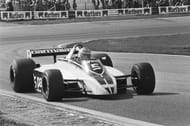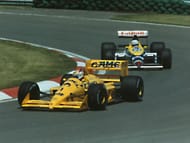If Fernando Alonso had won this year’s F1 drivers championship in Brazil, Sebastian Vettel would have felt a vague sense of injustice for he had clearly won more races than Fernando throughout the season. Yet, this was exactly how Nigel Mansell felt when Nelson Piquet, one of the most successful drivers of all time, won the 1987 driver’s title by winning only three races to Mansell’s six.
Nelson Piquet was born in Rio De Janeiro in a well to do family but had to fight a lot of battles to race competitively. His father wanted him to be a professional tennis player, and after he did well in the junior circuit in Brazil, he was sent to California. Piquet matured to be a good player but not a great one and he soon realized that tennis did not excite him as much as racing did, so he decided to return to Brazil.
Piquet’s dad did not approve of him kart-racing and so he had to use his mother’s maiden name ‘Piquet’ (his original surname was Souto Maior) to conceal his identity from his father. He made good strides in the national karting circuit, winning the National Championships in 1971 and ’72, and soon people were beginning to take notice of this wonder-kid. Upon the advice of the legendary Brazilian driver Emerson Fittipaldi, Nelson left for Europe, and after a year of acclimatising, he took to Formula 3 where he was hugely successful, breaking Sir Jackie Stewart’s record of most wins in a single season in 1978.
He made his Formula 1 debut in 1978 at the German Grand Prix with Ensign and qualified 21st. Piquet made an impressive start to the race but his engine broke down on the 31st lap, forcing him to retire. Piquet signed with the Brabham team for the last race of the 1978 season, which was owned by current F1 supremo Bernie Ecclestone. His team-mate was the legendary Niki Lauda, winner of two F1 world championships. Although Piquet could only finish four out of the fifteen races he took part in that season, it still bettered the result of his team-mate Lauda, who could finish only two. Piquet did not have a single podium finish to his credit that season but that was largely due to the unreliable Brabham car at his disposal.
1980 was a breakthrough year in Piquet’s Formula one career; with Lauda retiring at the end of the previous season, he was the main driver. Throughout the course of his career, it was seen that Piquet thrived when he had the team’s undivided attention – having a challenging partner was not something he preferred. He started the year well and finished second at the Argentina GP behind the eventual champion Alan Jones. Piquet’s form improved as the season went on and it was at the United States Grand Prix that he won his first competitive F1 race. He led the standings going into the final two races but lost out to Jones due to engine failures. It was disheartening to see the young man lose from such a comfortable situation but as it turned out, it made him more resilient and focused and was only a small bump in his climb to greatness.
1981 was the season that saw Piquet win his first Formula 1 Championship. With a few adjustments in the car setup (some of which often drew criticism from the FIA and fellow teams), Brabham appeared as the fastest car on the circuit, and Piquet the driver to beat. Things, however, were not that straightforward, and abject engine failures had Piquet trailing Carlos Reutemann by as many as seventeen points at one stage of the season. He, however, staged one of the greatest comebacks in F1 history when he clinched the title at the last race in Las Vegas after finishing fifth, winning by a solitary point over Carlos. So exhausted was Piquet by the heat and the tension at Vegas that at the end of the race, he had to be lifted out of his car. A lifelong dream had been accomplished for the Brazilian, whose only ever goal in life was to drive fast.
“I don’t want to make friends with anybody. I don’t give a s*** for fame. I just want to win.”
Piquet had tasted glory and was now enchanted by it. He now wanted more but 1982 was an up and down year for him. Brabham had made an alliance with BMW and introduced turbo-charged engines to the car, but they were too unreliable and as a result, Piquet suffered. He won the Brazilian GP but afterwards, again fainted on the podium. The car also had an on-going battle regarding its weight and was constantly questioned by Ferrari and Renault. This led to his disqualification from the Brazilian GP and his only win of the season came at the Canadian GP. He was also involved in an on-track fist-fight with fellow driver Elisio Salazar after Salisio crashed into him at the German GP. Piquet was furious at him for ending his race abruptly, as he was on course for his second win of the season. He finished a disappointing eleventh in the drivers standings.
The 1983 season saw Piquet win his second Formula 1 title and the first with a turbocharged car. He won races in Brazil and South Africa and backed it up with strong finishes at Italy and Monaco as well. The season also saw the arrival of the young Frenchman Alain Prost, who would be his chief rival in the years to come.
The following years were not so fruitful for Nelson as the repeated unreliability and technical problems of the Brabham team made it difficult for him to gain a level of consistency, and towards the end of the 1985 season, he decided to move on after a seven year stint with the team which yielded two drivers championships. He joined Williams, and that was the beginning of one of the greatest F1 rivalries between him and Nigel Mansell.
Both Mansell and Piquet were the most talented drivers on the circuit, and pitting them in the same team was a disaster waiting to happen. And it eventually did, costing them both a driver’s championship at the hands of Alain Prost who won the championship despite possessing an inferior car. Piquet was furious with the Williams team for not giving him the number one driver status in the team and instead allowing both of them to go for the win. Incidentally, this was the most successful season for Piquet as he ended the year winning four races, the most he ever would.
“Piquet is just a vile man” – Nigel Mansell
1987 saw more fireworks between the two and it was in this season that Piquet applied his famous “percentage driving policy”, which saw him rack up a staggering ten podiums in sixteen races and confirmed his third and final F1 championship. This was undoubtedly the best championship win for him after he suffered a crash at Imola early on and then had to withdraw in the Belgian GP. He made a strong return, going on a run of nine successive podiums. He stated during the season that he had already agreed to join Lotus at the end of the season as he felt that Williams had not lived up to their promise of making him the undisputed number one driver in the team. Piquet stated that the crash had a huge psychological effect on him as he could not wait to return and beat Mansell, and it also lead to him experiencing insomnia.
He enjoyed a not-so-successful two year stint with the Lotus team, finishing sixth and eighth respectively. By now, another Brazilian, Ayrton Senna, had taken the mantle as the Number one driver in Brazil from him, and his rivalry with Prost was what had millions attracted to the sport. He drove for Benetton for the final two seasons of his career and made a strong finish to his first season with the team finishing third in the standings. The ‘92 season turned out to be his last with the emergence of Michael Schumacher on the scene, and Piquet quit at the end of the year after nearly fourteen years in the sport.
Piquet was always an eccentric driver who lived a playboy’s life. He had a house in Monaco with a boat that was always ready with a crew and he married women for fun, fathering a lot of children in the process. And yet, Piquet will forever be remembered for his consistency rather than his dominance in motorsport, and to this day he remains the most successful Brazialian driver alongside Ayrton Senna. Piquet was inducted into the International Motorsport Hall of Fame in 2000 and has two circuits in Brazil named after him. In 2012, BBC Sport ranked him 16th in the list of greatest F1 drivers.
“Through F1, I bought my own boat. I learned to fly my own plane and helicopter. And my job with my company is a reflection of everything motorsport taught me.”


